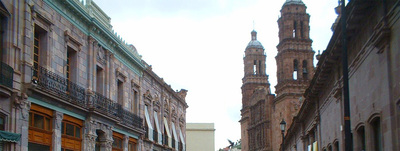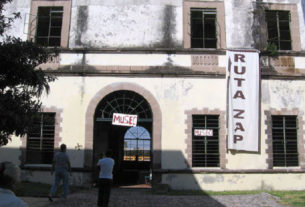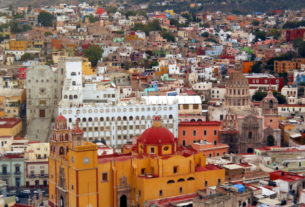Vanessa thought it would be the perfect vacation: a full week on Mexico’s Mayan Riviera, as the travel agent had called the Yucatan coast. The agent had suggested the small city of Campeche, stressing that it was a place not yet discovered by hordes of Americans, a pristine paradise a few hours south of Merida. Brushing aside the agent’s hyperbole, Vanessa thought it might at least be a good place to relax. Seven days in a luxury hotel, with excellent food, daily massages, time to soak in a hot tub and dream of the future. Time to explore the nearby Mayan ruins at Edznas or those further north at Chichen Itza. Time to do some soul searching. She knew this was more than any American poet of modest means had reason to expect.
When Vanessa and her husband Albert Del Principe had left the travel agent’s office on Sixth Avenue and were settled in a nearby restaurant for lunch, Vanessa asked her husband how they could afford it. He told her vaguely that he had made a “substantial profit, yes, a bona fide financial windfall” from the sale of his mother’s house in Connecticut, the one he’d held onto ever since her death five years earlier.
From the beginning it had all seemed too perfect, too unreal. At fifty years of age, Vanessa had long ago learned that anything that appeared too perfect was bound to have some menacing complications lurking just below the surface. At least a week prior to their departure from New York, Vanessa became sure that something was wrong. Albert seemed distracted and tense. She knew there was a serious issue that needed to be discussed and expected to learn what it was during their flight to Mexico City, but Albert remained taciturn for the entire trip.
It wasn’t until two days into their “perfect” vacation, at dinner in the five-star restaurant of their luxury hotel, that Vanessa at last found out what was troubling her husband. One of the main reasons for this vacation, Albert told her once they had placed their order for broiled salmon, was his concern about aging and his health. He was about to turn seventy, a truly significant age, he said, when you cannot avoid the issue of physical deterioration and your ultimate demise. “No matter how well you take care of it,” he said, “the body just wears out, like any other machine.” Vanessa had immediately responded that he was being morbid, hoping that he would let the matter drop. But she could see that it was something of great importance to him and she realized she had known all along in her heart that this fear of his would only grow larger as he grew older. When she had married him she was thirty-five and he was a very vigorous fifty-four and, though it had fleetingly crossed her mind, the possibility of his becoming incapacitated had never been discussed or accepted as inevitable.
“Many of my friends are not in good health,” Albert said sadly. “And their wives will soon become their nursemaids.” He paused. “I don’t want that to happen to you. I don’t want you to be my Florence Nightingale. So I’m telling you now, my darling, that if and when it should come to that, if I should develop Alzheimer’s for example and my mind goes, I want you to know ahead of time that you have the option of calling in the Hospice people and bowing out. I like to think of you living and enjoying life. You are still a young woman, and I don’t want to deprive you of that.”
“Let’s hope that’s still a long way off,” Vanessa replied, trying her best to remain cheerful.
Albert paused and looked away. “Well, maybe it is and maybe it’s not so long as you would like, my dear. I’ve been diagnosed with a spot on my lung that might be cancer. It could be years or it could be months before it develops into a full blown condition. So if you do decide to stay with me… Please understand that I am giving you the option of leaving before things get tough, before I go through any horrible changes and you start to resent me. I want you to remember me as the” (he smiled and winked here) “handsome and sexy guy you married, not as a drooling old man, weak and needy, with you feeling exhausted and at the end of your rope….”
Vanessa had been struck speechless by the shock of this sudden revelation. She blinked and looked away, still at a loss for words. What would become of them now? What would become of her if she left him? Could she make a new life on her own? Could she deal with the guilt of leaving him? Would she grow to hate him if she stayed? Thoughts like these surged through her mind, both selfish and unselfish thoughts. The poor man, so scared, so honest, so heartbreakingly needy but trying to act strong and noble.
“Are you sure? Is your doctor so absolutely certain, so completely beyond a doubt?” The words flowed out of her at last in a rush.
“I’m afraid he is, Van. I’ve seen the best specialist in New York and even got a second opinion after that.” He paused to squeeze her hand, and the irony of it was not lost on her. “You know how I am. I wouldn’t have told you now unless I were one hundred percent sure.”
Vanessa nodded as she fought back the tears, but not all of them. “I’m so sorry, Albert,” she said in a choked voice.
They held hands across the restaurant table in silence. Vanessa’s tears suddenly overflowed and her body trembled. What will happen to us? What will happen to me? Can I bear to watch him deteriorate? she thought. He’s seventy, how much longer will he live? Will I ever be able to find another mate?
She was aware that Albert had been careful not to say he would need her to be his caretaker, but Vanessa knew it was implied. Albert was too sensitive and intelligent, and after fifteen years of marriage he knew her too well to say it directly, but Vanessa knew it was expected of her. Self-sacrifice was always expected of a woman, even now in 2007, a good forty years after the dawn of feminism. And she also knew that since they were childless, since Albert had never complained about her decision not to have children despite how much he wanted one, that given this history and the current conditions that he believed, though he would not say it, that Vanessa his wife was morally obligated to take care of him. She knew he felt this way, though he would not say it.
The following morning at breakfast, amazed and embarrassed by his cheerfulness, Vanessa told her husband that she would need time to think it over, and watched as the life drained from his face.
“I know you believe in your heart of hearts, though you’d never say it, that it’s expected of me.” She held up a hand to prevent him from objecting. ” But we promised long ago to always be truthful with one another no matter what. and after fifteen years this is no time to stop. So here it is: I’ve been unhappy for almost three years now.” She paused and had to look away from the pain that flared up in Albert’s eyes. “I’m sorry to have to tell you this now under the worst possible conditions… No doubt you’ll think me the most evil woman on the planet… but my feelings for you have changed.”
“What do you mean exactly? Changed how?”
“I mean that I don’t… feel the way I used to feel about you.” She paused again, this time to gather her strength. “I mean I don’t love you anymore. Not the way I used to. Not with any real passion.”
“My God, you poets. You mean you have to have passion? You feeling nothing for me? Is that what you’re saying?”
“Of course I still have feelings for you, Albert. We’ve spent fifteen years of our lives together, so how could I feel nothing for you?” She saw the resentment and bitterness flash across his face. “Please don’t hate me for being honest with you. I know what you want me to say but I can’t say it. I can’t say I’ll stay by your side and nurse you through to the end. I can’t promise that, Albert. I don’t think I ever had it in me to do that, and especially not now.”
“So what are you going to do?” He paused. “Just fly away?”
“I’ll ignore that unkind and unfair remark. I don’t know yet what I’m going to do. But I’m not returning to Connecticut with you. That much I do know. I’m going to stay here until I figure things out.”
“You can’t afford to stay here,” Albert gloated.
“Not here in Campeche, but I am going to stay in Mexico for a while. This is the right place for me to do some soul searching. I may change my mind after a while. I don’t know. I need time to be sure of my decision.”
“Do what you have to do,” Albert retorted sharply. “I have nothing else to say to you except this: If you really have stopped loving me, if you really have none of those romantic feelings for me, as you say, then there’s no point in going on. I don’t want you to stay with me out of pity or obligation or anything short of love. I’d rather just suffer through this on my own than know you’re doing me some kind of huge favor.” He rose from the table and turned away, angry and proud and full of self-pity.
“Albert, please. Not like this,” Vanessa called after him. Watching him stride out of the restaurant, she felt a deep pang of remorse and wondered how she could do this to the man she had once thought she would be with forever. He grew smaller as he walked away from her, a natural optical perception, but his body seemed to shrink with every step he took, as if he were moving on into the future at accelerated speed. She averted her gaze out the window at the endless expanse of the Gulf of Mexico, its surface a tarnished silver grey, dark and foreboding. Somehow, she thought, I will find the strength to do what I have to do.
In the recesses of her mind, unrealized by her until this moment, a rudimentary plan had been coalescing. This was her new idea in an embryonic form: Vanessa remembered dimly an aunt she had met once as a young child, a beautiful and exotic-looking woman, her father’s younger sister, who came to stay for a week with her family when she was growing up in a Hartford suburb. She recalled vaguely now that this aunt was from Mexico and at the time Vanessa had met her she was still living in the city where she and her father had been born. Chances were that she was still living there. Over her third cup of coffee Vanessa ransacked her memory for the aunt’s name, using the strategy she had learned in grade school whenever she needed to remember the name of someone (she had a good memory for everything but names) of going through the alphabet and saying each letter out loud. If that didn’t work she would simply clear her mind and meditate and eventually the name would float into view like a fish swimming to the surface. In middle school she had possessed an eidetic memory and could visualize entire pages of her text books, but that gift had long since vanished. She began repeating the alphabet and paused at the letter “V,” sure the woman’s name began with the same letter as her own. A moment later she had it. Her long lost aunt’s name was Veronica. Now if she could only recall the name of the city where her father was born. She pondered for another fifteen minutes until she felt she was developing a mental cramp, but neither mnemonic technique could help her. What she needed was to see the name of the city, and then she was sure she’d recognize it.
Leaving the restaurant, she went straight to the hotel’s business center where she sat down at a work station and switched on a computer. The screen lit up with Google Mexico and in another minute she was looking at a map of the country. She scanned the entire map, which looked to her like an upright cornucopia. Zacatecas was the only name that tickled her mind. That must be it, she thought. She did another Google search and found photos and tourist info. Zacatecas was a colonial city in north central Mexico about eight hours from Mexico City. It had once been rich in silver mines. She recalled her father’s love of silver jewelry. That’s an interesting connection, she thought, but how will I find out if my aunt still lives there? Who would know? She sent an email to all the relatives on her father’s side in her address book and by lunch time she heard back from a cousin who had visited this aunt only last year. “Most likely she’s still living there. She has a beautiful old house and is not doing that well health-wise, so it’s unlikely she’d move at this point,” her cousin wrote, giving her her aunt’s address and phone number. “Ah, the wonders of technology,” she mused as she booked a hotel in Zacatecas through a web site travel service.
Vanessa decided it would be best to call her aunt after she had arrived, and she got instructions from the concierge about travel arrangements. Since she was soon to be a pauper, she asked him to advise her on the most economical way to travel across Mexico. The concierge gave her a dubious look and told her that most Mexicans traveled around the country by bus. The Mexican bus system was excellent, he told her with a note of pride. “But wouldn’t the señora prefer to go by plane? The hotel limo will bring you to the airport where you could take a direct flight to Zacatecas?” Without hesitation, Vanessa replied, “No, the señora would prefer to go by bus.” Then added, “I would like to see the countryside.” The concierge only nodded, seemingly unconvinced. What Vanessa didn’t know at the time was that the excellent buses of Mexico traveled mostly at night.
After a final dinner alone in the hotel’s elegant “Mariposa” room overlooking the beach, anxious that Albert would reappear despite knowing that he had checked out that afternoon, Vanessa took a taxi to the bus depot and boarded the green and silver Estrella Blanca coach for Mexico City, where she would have to transfer to another bus that would take her all the way to her destination. She had trouble understanding her feelings as she set off. She was both exited and apprehensive. Once she had worked as a freelance arts reporter for what was called an alternative weekly newspaper in New Haven. The editor had called her a writer-at-large, a roving reporter, and that label seemed to fit her now. She was exploring for whatever she could find of interest to her soul. She was an independent woman, a poet-at-large.
The entire trip was grueling and Vanessa had ample opportunity to regret her need to economize and to reflect on her decision to leave Albert. The bus traveled non-stop and she did get to see some of the countryside. The terrain was mostly mountainous and the roads were quite narrow and steep, although they did afford some magnificent views of the valleys. The bus seemed to lurch and swerve like a giant sperm whale showing off his prowess. More than once, and several times quite loudly, Vanessa muttered that the driver must be insane, or a drug addict on amphetamines. And once a man’s voice replied out of the darkness, “No, Señora, he is but simply a Mexican bus driver. They are all like this.” “No wonder he has a crucifix on the dashboard,” she muttered back. But there was no response from the darkness.
Miraculously, she believed, they arrived at last in Zacatecas, a bone-rattling, stomach- churning, rump-pounding 29 hours later. The bus pulled into the depot as the sun was peering over the crests of the tawny green mountains that had bumped their way into a circular formation that now cradled the old silver mining city of Zacatecas, “the place where the grass grows,” as the Aztecs called it. Vanessa disembarked with her luggage, a black canvas carry-all bag with a shoulder strap. As she entered the cavernous station, the smell of breakfast cooking hit her hard; her stomach growled, and she yielded to her hunger. She followed the aroma to a cafeteria counter and ordered her food from a middle-aged woman dressed all in white, like a nurse she thought, including latex gloves, a cap and surgical mask. Then, after finishing off a delicious tortilla stuffed with scrambled eggs and beans, she went out into the delightful morning sunshine and climbed into the first available blue and white compact Nissan taxi cab and settled back for what turned out to be a relatively smooth ride to her hotel.
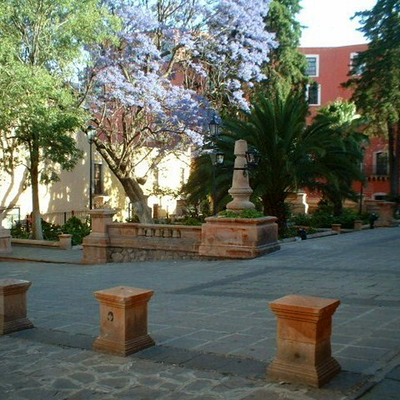
She felt elated, free, exhilarated by the striking beauty of her new environment. Here was the real Mexico, she thought. The authenticity of the place was like a grainy texture, almost palpable, thickening the atmosphere. It was both comforting and satisfying, especially after the ersatz and shallow veneer of Campeche, an old city painted over with the garish colors of the tourist trade. The plaster and concrete houses they were driving past were done up in innocent blues and yellows, honest ochers and oranges. They were built on the sides of hills and from a distance looked like the Lego blocks her nephews loved to play with. Thinking back days later to this taxi ride, she realized her first impressions of Zacatecas bordered on the hallucinatory due to lack of sleep, and yet, because of her deprivation, her senses were in a heightened state of receptivity, and the images penetrated deeply into her psyche where they seemed to stir up dormant yearnings for something she did not yet fully understand and could not yet define before settling there like bedrock.
Her arrival at the hotel was a blur. She vaguely remembered being told that she couldn’t check in for another hour and spending that time in a park across the street where she watched, in a trance-like state, the pigeons strutting, a fountain jetting, and a few children playing. Anyone seeing her, she thought later, must have taken her for a poor lost soul, a victim of autism or a drug addict. However, the contrary was indeed true, and so her appearance was quite deceiving: she was, in fact, in a blissful and transcendent state of mind. She further recollected, as though seeing it through a mist, that she had made her way back to the hotel and up to her room where she collapsed on the queen-sized bed in a sort of euphoria of exhaustion and fell into a deep, luxurious sleep that lasted until the next morning.
As soon as she was able, upon rising from her 24-hour nap, she left her room and headed directly down to the restaurant. She was famished, and managed to put away the equivalent of three breakfasts — scrambled eggs, waffles, home fries, juice, coffee, and a blueberry muffin. The astonished waitress smiled, her eyes widening more each time Vanessa ordered another plate full. “I haven’t eaten in days,” Vanessa explained. “You know how it is when you’re on the run.” As the waitress laughed and walked away Vanessa realized that her statement could be taken the wrong way. Just like me to say something misleading in an off-hand and unguarded moment, she thought. When the waitress returned with her food, she made an attempt to clarify by saying, “I’ve never enjoyed eating so much in my life.” That too might be misconstrued, she realized. Some devilish impulse got into her at that moment and she continued with, “Feast or famine is the way of life for us fugitives, us women-at-large.” She smiled and the waitress laughed, though she looked a bit puzzled. A small bond had been established between them.
Restored by food and sleep, Vanessa sipped her third cup of coffee and contemplated her next move. The atmosphere in the restaurant was hushed and dimly lit. The drowsy sound of a splashing fountain came in from the courtyard. As a result of her contentment, Vanessa’s eyelids started to droop and she shook herself into a state of alertness. After a few more moments, though, sleep beckoned once again. “Morpheus calls,” she thought. “Mustn’t listen.” And then, “Good title for a poem. ‘Morpheus Calls.'” And she wanted to jot it down on a napkin but the pen in her purse was out of ink. She didn’t want to bother the waitress over a trifle. “I’ll just have to remember it,” she thought.
When the waitress brought the bill Vanessa asked her to recommend the best place to begin exploring the city. Without hesitation the waitress told her to begin at the old cathedral in the historic center and offered to give her directions. It was within walking distance, so Vanessa decided to make her way there on foot.
“I can call my aunt this afternoon or this evening,” she thought as she passed through the lobby. “But first I need to look around and get my bearings a bit. The truth was she needed more time to prepare herself to meet this woman whom she recalled as being a rather imposing and intimidating figure.
As Vanessa walked along the narrow stone streets of the city’s core she tried to take everything in: the old colonial buildings made from the local pink stone with their columns and courtyards, the fountains, the Zacatecas Cathedral with its ornately carved pink stone façade and plain, peaceful sandstone interior without a drop of gilt, the beautiful faces of the brown-skinned people with dark eyes and glossy black or chestnut hair….
She returned to her hotel late that afternoon, footsore but energized and excited by all she had seen. As she lay down on her freshly-made bed to rest and reflect this thought struck her forcefully: Why do I feel at home here? And then, “Why do I not feel any guilt over sending Albert back to Connecticut alone while I sort out my feelings?”
She dozed off and woke up fifteen minutes later feeling fully refreshed and ready to contact her aunt.
A little apprehensive still, she picked up the phone and dialed the number her cousin had given her. The sound of the ringing at the other end seemed milder and less insistent than it usually did in the U.S. No one was answering. She let the ringing continue more than the customary four times (what was the standard number here? she wondered), waiting patiently as she ran her fingers over the comforter and imagined the sound of the rings vibrating down long stone hallways and out across the central sun-filled courtyard of her aunt’s immense colonial house. Then a morbid thought flit through her mind: No one is there and my aunt is dead. The ringing seemed to go on and on for a very long time and she seemed transfixed by the sound itself. She was about to hang up when someone picked up and said, “Bueno?”
In her relatively fluent Spanish, Vanessa asked if she were speaking with Veronica Valdez. “You are,” was the husky-voiced reply. “Who is this, please?”
Vanessa identified herself and offered a brief explanation for her unexpected arrival in Zacatecas.
Her aunt did not seem in the least surprised or flustered by the news. Her tone of voice was calm but warm and inviting as she said, “How nice to hear from you after so many years. Yes, I’d love to see you now that you’re all grown up and speak Spanish so well. Please come to dinner. And bring your things. I have a spare room and no one is staying with me at the moment. Do you know my address?” Vanessa confirmed that she had the right address. “You will never find your way here by bus, my dear. You must take a taxi.”
“I was planning to, Aunt,” Vanessa told her, adding that she would be there in an hour and, saying good-bye, she hung up the phone.
As she gathered up her things and packed them in her traveling bag she wondered why her aunt hadn’t seemed surprised to hear from her. Could it be that her cousin had told her she was coming? Most likely that was the reason. And that comment about the bus. Had her cousin also informed her that Vanessa was now “just a poor poet on her own and at loose ends” as she had described her in the email message with her aunt’s address? That too was likely considering her cousin’s love of gossip and tendency to dramatize.
The taxi ride took her through a labyrinth of steep an winding streets, some of them so narrow that Vanessa thought they would get side-swiped or scrape up against a curb. People darted across or stepped from doorways almost into the street itself, but the driver remained calmly in command of his nimble cab. So unlike New York, she mused, where the traffic was always in a state of controlled chaos and an ongoing war raged between vehicles and pedestrians. Here in Zacatecas, she observed, an agile civility prevailed. Everyday life in the U.S. had become much ruder and more brutish since she had been a child and Vanessa realized now how far a little common courtesy went towards making a city more livable.
At last the taxi driver pulled up at her aunt’s address and she paid him and stepped out. Hoisting her travel bag onto her shoulder, she went up to the old wooden door and found the iron knocker. She stared at the weathered wood of the heavy door and thought of all the time that had passed since it was first planed and hung on its hinges. It had the character of a lined and seasoned face, and one could almost read the history of the city there, as if it were the page from a book. She turned her head and looked down the steep hill at the other old buildings and up at the mountain with its rocky crest in the shape of a defiant fist. The opening of the door startled her. Instead of her aunt she beheld a small boy of 7 or 8. Vanessa blinked and smiled in surprise. The boy smiled back.
When Vanessa stepped inside the boy closed the door behind her. “Abuela is resting,” he told her. “Come with me. I will show you to your room.”
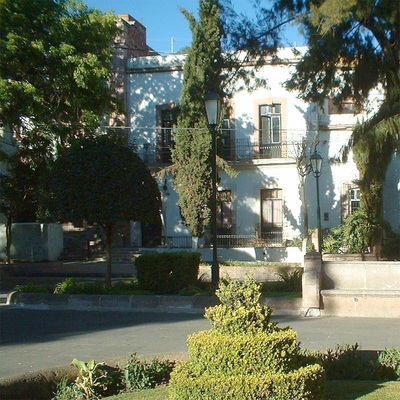
She followed the boy along the terra-cotta tiled floor and down the main corridor. The white stucco walls were covered with paintings, hangings, photos, masks, baskets… artwork was everywhere, a jumbled profusion of objects. Vanessa’s eyes widened more and more as she tried to take it all in. The boy led her across a compact courtyard filled with huge cacti and ferns where brightly-colored tanagers were fluttering and singing towards a darkened room with its door open. Vanessa followed the boy inside and looked around as he opened the green shutters. The room had a high ceiling and was plainly furnished with handsome old wooden furniture, except for the bed frame which was made of brass. The plainness and simplicity of it appealed strongly to her, and the entire house itself had a good restful feeling to it. A sanctuary, she thought. She turned around to ask the boy his name but he had vanished. She smiled and her attention was caught by a striking painting of calla lilies down in the fauvist style in bright colors. The signature gave her a little jolt — it was her aunt’s, and it was highly accomplished work. She had much to learn about this aunt of hers, she thought. She sat down on the bed and noticed a photo on the night table. It was a black and white portrait of a woman in her fifties and on closer examination Vanessa realized it was her aunt and that she had looked very much like herself.
A half hour later there was a light tap at the door and Vanessa opened it to the boy, who, nodding and smiling, told her that her aunt awaited her. In fact, Vanessa could see her standing in the courtyard amidst the plants, one hand on her cane, the other held up with a sulfur-crested white cockatoo perched on her finger.
“Come say hello to Orlando,” her aunt called in her sonorous, husky voice. “He loves meeting new people.”
As Vanessa drew closer she saw that the hand that held the bird was as frail looking as bone china. The woman herself was like some fragile porcelain figure with white hair and green fingernails. Her aunt’s face was long and creased, her eyes a burnt umber. She was smiling and Vanessa spotted a few gold teeth.
The bird fretted as Vanessa approached and raised her hand with forefinger bent to stroke its head.
“Tranquilo, Orlando. Tranquilo,” her aunt murmured, making a deep-throated humming sound to calm the bird.
Orlando caught Vanessa’ finger in his beak. She felt the roughness of his tongue against her skin and it gave her an odd sensation as if she were touching something forbidden. Orlando let go of her finger.
“That’s his way of shaking hands. And now that he’s made your acquaintance he will be much calmer and quieter,” her aunt said as she let the bird jump off and fly back to his perch.
Vanessa embraced her aunt then, and in doing so felt her thinness and frailty with a pang in her heart. If her mother had survived she would be her aunt’s age. The robust woman she remembered from long ago had withered into this stooping delicate creature smelling of ruin and decay. The strongest part of her was now her voice. All her physical strength and drained away and vanished. Yet she had grown in spiritual vigor and of that Vanessa was only dimly aware.
“Oh, Aunt,” she cried out with a throbbing in her breast and a catch in her voice. “It’s been such a long, long time.”
“So it has, my dear. And if you don’t stop squeezing me I will break into little pieces.”
Vanessa released her, laughing and flushing with embarrassment because she was so overcome with emotion.
“Would you care for some brandy, my dear?”
“Yes, thank you. I’m sorry, I don’t know what’s come over me. I’m not usually this emotional.”
“You’re probably just worn out. Traveling is so exhausting. I can’t do it anymore, and I used to love it so.” She paused. “Why don’t we sit down and have a chat before dinner. Pablito, will you bring us some brandy, please?”
“I didn’t know you had a grandson?”
“I’m sure there is very little about my life that you do know. And I know as little about yours. Pablito is the neighbor’s boy, and I couldn’t manage without him. I pay him for his help with chocolates and a few pesos. We’re grown very fond of each other.”
Vanessa and her aunt sat in the courtyard and conversed while their dinner was being prepared next door by Pablito’s mother. Vanessa learned that her aunt had been married for twenty years to a mining engineer named Javier Castillo who had been killed in an accident in one of the local silver mines. That was 30 years ago when she was 45 and he was 50. They had had no children, and her aunt had lived alone since her husband’s death.
“Why didn’t you remarry?”
Her aunt smiled wryly and looked up at the warm October light streaming down into the courtyard. “I never fell in love again, my dear. And besides, no man could equal Javier in my eyes. He had everything, good looks, passion, intelligence. A man with all his qualities is a rare specimen.”
“Why not get married again, if only for the companionship?”
“I am very rarely lonely, my dear. And besides, if I had remarried in my fifties or sixties what could I have expected? A man at least ten years older who might have gotten sick and needed to be taken care of. No, you reach a point in life where you say, ‘I’ve had my good years and now I mustn’t hope for any more. I must go on living for myself and no one else. I must take each day as it comes, content to be in good health and grateful too for life’s small blessings.”
These words struck a deep chord in Vanessa. “I think I’ve reached that point in my own life, Aunt. I’m fifty now, around the age you were when you lost your husband. My husband and I have separated after fifteen years of marriage. His third, my second. He’s turning seventy….” And with these words Vanessa opened up to her aunt, with whom she suddenly felt a special closeness that was completely unexpected, telling her the whole recent story of their vacation in Campeche, her husband’s revelation about his failing health, and her decision to leave him. There were tears in her eyes and an aching in her throat as she spoke not realizing until this moment how much pain had been blocked out or numbed by her determination to get to Zacatecas. All that pent up sorrow, anger and guilt burst forth now. “Do you think I’m a horrible evil woman for not staying with him?”
“Not at all, Vanessa, not at all. Calm yourself. Pablito, bring my niece some more brandy.”
The boy, who seemed always to be present in the doorways or among the plants, answered “Sí, Abuela,” and then vanished and returned again with the bottle of brandy. He poured some of the golden brown liquid into Vanessa’s glass and set the bottle down on the table.
“Thank you, Pablito. Now go tell your mother that dinner will be delayed a while longer.”
“I’m sorry, Aunt. I’ll be fine in a minute. I don’t want to delay your dinner on my account. I don’t know why I’m so emotional.”
“It’s perfectly natural, my dear. You will feel much better in a few days. You need to grieve. You need to let the pain burn itself away. Perhaps you’ve made the right decision. Perhaps not. Time will tell and you may know for sure in a few weeks or so. You can stay here with me until you know for sure what is the right thing for you to do. There, there. You’ll feel better when you get your strength back and have a clear head again. No one can tell you what to do now. You’ve got to listen to your heart. I’m sure I’m just reminding you of what you already know. Orlando is such a sensitive creature. Look at the way he’s tilting his head. He’s heard the pain in your voice and I think there are tears in his eyes. Come, come, Vanessa my dear, no man is worth all this suffering, unless he’s a man like my Javier.”
Vanessa asked her aunt where the bathroom was and excused herself, saying she’d be fine in a moment. When she returned a few minutes later she had freshened up and regained her composure.
In a very short time, she had grown immensely fond of her old aunt and was now doing all her errands for her and caring for her daily needs in a hundred other ways. Her life in Zacatecas was taking on an order and a purpose unlike anything she had imagined or expected. And she had to admit to herself that it was comforting. Her heart was more at peace now than ever before, and her mind took pleasure in this new order of things. This love of and need for order was one of the chief reasons she wrote her poetry in formal verse. She enjoyed the order and harmony it brought to her thoughts and feelings.
This idea of fate directing her actions like some stage manager sequestered in the darkened wings of a theatre had taken hold of her mind with a strange new force. And it was compellingly confirmed by a visual image that stood out sharply from all the others that had flooded over her in this new city. It was the image of an interrupted aqueduct, the remaining section of an ancient aqueduct that stood near the park where she had wandered in a daze, while she passed the time until she could go up to her hotel room, on the morning of her arrival in Zacatecas. She had returned to look at it several times during the last few weeks, and the sight of its roughly two dozen arches and six reinforcing buttresses had been deeply imprinted on her mind. She knew there was some important metaphysical meaning behind it for her, but she could not figure out what it was. Did it mean that her life was in decline and would turn into a ruin? Had the decay started the moment she left Albert in the lurch, as it were? Perhaps it symbolized a ruined home, an unfinished life, a disruption in the natural flow of energy. She pondered hard, striving to penetrate its mystery, but the meaning eluded her, defied all her attempts to solve the riddle. She had even begun to dream about it. In one of the dreams, blood flowed along the channel at the top and came cascading down where the aqueduct ended abruptly at a high stone wall. In another, she was a young girl running across the top or riding a swing suspended from the center arch. In yet another, a man hung by the neck from each of the seven arches and all of them had her father’s face except for the one in the center which looked like Albert. She finally accepted that significance of the aqueduct would be ever changing. Ultimately, it would remain an enigma.
About three weeks into her visit, Vanessa’s aunt had one of her diabetic episodes and had to be taken to the hospital. During her more serious attacks, her aunt lost consciousness, and this was one of the worst. She was unconscious for almost 24 hours and her doctor decided to keep her hospitalized for treatment and observation. He told Vanessa that if all went well, she would be able to leave in about a week.
Seven days later her aunt’s condition had stabilized and she appeared to be fully recovered. However, prior to releasing her, the specialist in charge, a distinguished-looking middle-aged man, gave her stern warnings and redoubled her medication. He also spoke with Vanessa and told her that her aunt was in seriously failing health and her deteriorating condition made a caretaker a necessity. Unhesitatingly, Vanessa declared that she would take on that responsibility.
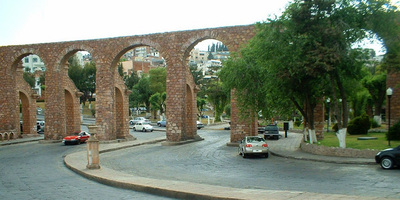
“You might want to consider a nursing home. There’s an excellent one in Guadalupe, the city adjoining Zacatecas, run by the Franciscans attached to the cathedral there, the one with the museum.”
“Yes, I’ve heard of it, but no thank you, Doctor. I’ll care for her myself. I don’t want her to have to leave her home to live with strangers. I know how important her house is to her.”
“It’s a rather large responsibility for anyone, especially someone… who isn’t used to it. Are you sure? Why don’t you take some time to think about it?”
“I’ve been thinking about this issue for quite a while now. And, yes, I’m sure.”
“Okay. Well, I admire you for your dedication to Veronica. She’s very fortunate to have you. If you should change your mind just let me know.”
Vanessa and Veronica left the hospital together and got into a cab. Vanessa held her aunt’s frail hand and glanced at her delicate profile. ‘I may be where she is one day,’ she thought, ‘and without children who will take care of me?’ Her aunt turned to her and smiled as she squeezed Vanessa’s hand tightly. Her face was radiant and beautiful. Vanessa’s gloomy thoughts vanished like a puff of smoke.
“Yes, Aunt? What is it?”
“Nothing. I was just thinking. Before you appeared so suddenly in my life I had been obsessed with the desire to have a daughter. Silly, wasn’t it? How could I have a daughter at my age? Nonetheless I couldn’t stop thinking about it. And I prayed for one in my old age, like Sarah, except there was no Abraham. And then you appeared like an angel of mercy. Funny, isn’t it?”
Vanessa smiled. “Yes, it is funny. Very funny. But here I am.”


